Featured Article

June 30, 2023
Field of Dreams (1989) - The entire film revolves around an Iowa cornfield, but some scenes were shot in Illinois corn fields as well in DuPage and Will County. Children of the Corn (1984) - Set in Nebraska, but some scenes were filmed in Illinois corn fields to capture the eerie atmosphere. Filmed in Mendota, LaSalle County, featuring various corn fields scenes. Signs (2002) - The crop circles, a central element of the film, appear in corn fields, including those filmed in Illinois. Some corn field scenes were filmed in DeKalb County and Stephenson County. In the Bedroom (2001) - There are a few scenes that take place in and around corn fields, capturing the rural setting. Road to Perdition (2002) - The protagonist's journey takes him through Illinois corn fields (Geneva, Kane County), adding to the film's atmospheric visuals. Man of Steel (2013) - Several scenes in the Kent family farm feature corn fields, portraying Superman's upbringing in Smallville, Kansas (Plano, Kendall County). A Thousand Acres (1997) - The film is set in Iowa but features scenes filmed in Illinois corn fields (McHenry County), showcasing the agricultural landscape. A History of Violence (2005) - A few scenes take place in a corn field (Downers Grove, DuPage County), adding a sense of tension and danger to the story. The Amityville Horror (2005) - The iconic house is surrounded by corn fields (Woodstock, McHenry County), creating a sense of isolation and dread. Superman (1978) - A young Clark Kent runs through a Kansas cornfield (Kankakee, Kankakee County), portraying his superhuman abilities as he leaps over the tall stalks. The Informant! (2009) - There is a scene where the main character is running through a corn field (Decatur, Macon County), adding to the film's quirky tone. Candyman (1992) - The titular character, known for his haunting presence, is often associated with eerie corn fields (some scenes in Chicago and Cook County). The Hunter (1980) - Several scenes were filmed in Illinois corn fields (Will County), capturing the beauty and vastness of the rural landscape. Porky's (1981) - There is a memorable scene involving a hidden peephole in a girls' locker room, located near a corn field (Hinsdale, DuPage County). The Burning Plain (2008) - The corn fields serve as a backdrop for some emotional and intense scenes in this drama. Filmed in Sandwich, DeKalb County, featuring scenes in and around corn fields. Just Visiting (2001) - The characters find themselves transported back in time to a medieval era, and a corn field is part of the setting (various locations in Cook County). Proof (2005) - A scene features the main characters having a conversation while standing in a corn field (Chicago and Cook County), emphasizing the rural setting. The Promotion (2008) - The corn fields are shown in the background, symbolizing the Midwestern setting of the film (Chicago and Cook County). Dillinger (1973) - There is a memorable scene where the notorious bank robber is ambushed by the FBI in a corn field (Chicago and Cook County). The Fugitive (1993) - A pivotal scene involves a confrontation between the fugitive and the law enforcement officers in a corn field (Wilmington, Will County).
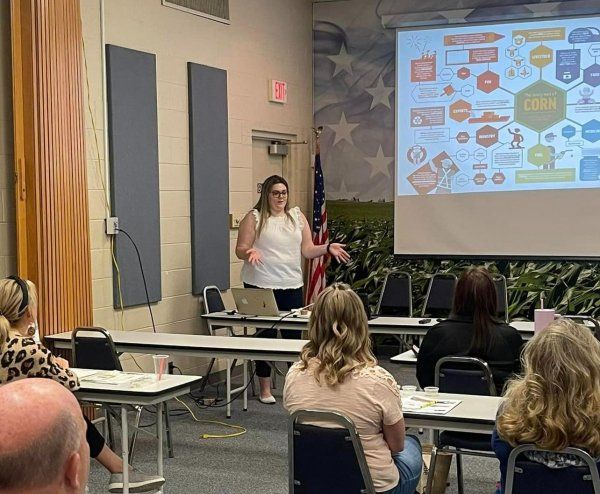
June 29, 2023
IL Corn is delighted to announce the successful culmination of its summer intern project with Illinois Ag in the Classroom , where interns passionately shared Corn 101 knowledge with teachers during the Summer Institute Ag in the Classroom events held across the state. This year, the IL Corn interns presented at over eighteen events, equipping teachers with valuable resources to bridge the gap between the farm and the consumer. Recognizing the significant disconnect that exists between modern agriculture and the general public, particularly in educational settings, IL Corn has prioritized fostering agricultural literacy through investing in Illinois Ag in the Classroom. The Summer Institute events serve as a crucial platform for IL Corn interns to engage with educators, enlightening them about the corn industry and providing them with the necessary tools to incorporate agricultural content into their classrooms.
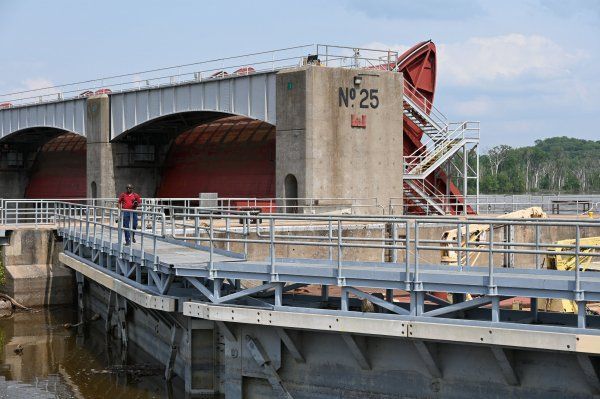
June 28, 2023
IL Corn celebrates Illinois’s bipartisan effort as three of the organization’s four targeted districts requested that funding for river infrastructure be included in the FY2024 House Energy and Water Appropriations bill. The $75 million is part of the Community Project Funding (CPF) process and was supported by Reps. Darin LaHood (IL-16), Eric Sorensen (IL-17), and Nikki Budzinski (IL-13). IL Corn requested the same support from Rep. Mary Miller in District 15, but her office declined. The CPF allows Members of Congress to ask for funds through the appropriations process for projects in their districts. The funding will support the Navigation and Ecosystem Sustainability Program (NESP) by constructing new 1,200-foot locks at locks in Peoria and LaGrange on the Illinois River and lock 20 through 25 on the Mississippi River. Community Project funds are supported at 65% by the federal government and 35% by the Inland Waterway Trust Fund. Farmers indirectly pay into the trust fund through diesel taxes placed on barge companies transporting products along the rivers. “In central and northwestern Illinois, the inland water waterway system and locks and dams infrastructure are vital to the economic and environmental sustainability of our communities,” said Congressman LaHood . “Inclusion of our funding request for the Upper Mississippi River and Illinois Waterway in the FY24 House Energy and Water Development Appropriations bill is a win for Illinois, especially in our rural and downstate communities. I am proud to continue our strong, bipartisan support for these important Illinois resources.” “Family farmers in Central and Southern Illinois rely on the Mississippi River to transport their commodities to the global market. But the locks and dams they depend on are nearly a century old,” said Congresswoman Budzinski. “By modernizing our inland waterway infrastructure, we can help our family farmers get their corn and soybeans to market more quickly and ensure that these critical transportation routes are sound for years to come.” "This historic investment in Illinois' waterway infrastructure would help our state's agriculture and economy boom like never before, solidifying our region as a leader in producing the corn and soybeans that feed the world," said Congressman Sorensen. "I'm urging the House and Senate to swiftly pass the bill with this critical funding to support our farmers and working families across Central and Northwestern Illinois.
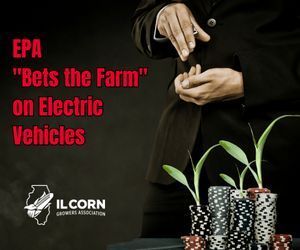
June 26, 2023
The Environmental Protection Agency’s vehicle emissions standards are driving the United States towards electric vehicles and away from renewable fuels. The EPA proposal, released in April, will require 67% of cars and nearly 50% of trucks sold in 2032 to be electric. The ruling would also impact ethanol production, costing the agriculture industry an estimated one-billion bushels of corn from 2022-2032. "I can't operate my farm with an electric truck,” said hog farmer and Illinois Corn Growers Association member Mark Wilson from Toulon. “This proposal does not consider the needs or the current infrastructure of rural America. We are putting all our eggs in one basket.” In addition to its push for electric vehicles, the regulations would significantly raise the price of eternal combustion engines after 2032. The United States’ electric infrastructure is not present to support an electric car fleet of this kind. There are currently less than 1,100 public electric vehicle charging stations in Illinois. Out of all the public charging stations 277 have an address in Chicago.
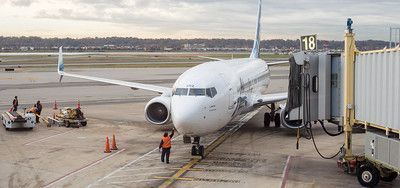
June 16, 2023
Senators Tammy Duckworth (D-IL), Deb Fischer (R-NE), Joni Ernst (R-IA) Amy Klobuchar (D-MN) and Chuck Grassley (R-IA) introduced a bipartisan bill this Tuesday, that would require Sustainable Aviation Fuel’s sustainability score to be defined by the GREET model, which accurately portrays the environmental benefits of corn-based ethanol. The Sustainable Aviation Fuels Accuracy Act of 2023 supports the use of Argonne National Lab’s Greenhouse Gases, Regulated Emissions, and Energy Use in Technologies (GREET) Model. The GREET model is the most accurate modeling of GHG emissions of corn-based ethanol available. The legislation complements the Biden Administration’s goal of producing at least 3 billion gallons of SAF per year by 2030. “One of the most important things we can do to make American aviation more sustainable is increase the supply of American-grown, American-made, sustainable aviation fuel,” said Duckworth. “I’m proud to partner with Senator Fischer, along with Senators Ernst, Klobuchar and Grassley, to introduce our bipartisan bill that will protect and ‘grow’ our sustainable aviation fuel sources stemming from America’s agricultural bounty, representing a true win-win solution that supports domestic farmers and blenders while reducing our carbon footprint.” “The GREET model leads the industry and accounts for ethanol’s ability to lower carbon emissions,” said Matt Rush, a farmer from Fairfield, Illinois, and the President of the IL Corn Growers Association. “We applaud Senator Duckworth for her work ensuring the sustainability efforts of corn farmers are recognized in new carbon reduction policies.” Illinois leads the nation as the first state to pass a tax credit for SAF. As of June 1, the legislation created a $1.50 tax credit per gallon for the renewable fuel.
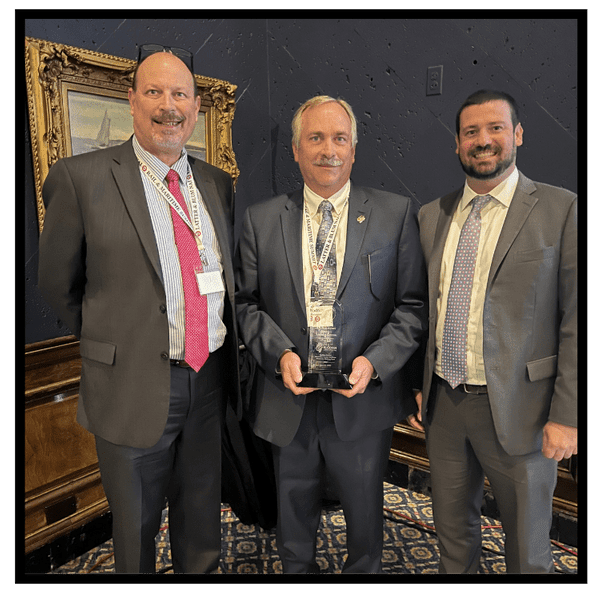
June 15, 2023
The 2023 Rail & Maritime Summit, a prominent event that unites distinguished professionals from the rail and maritime sectors, has proudly presented the esteemed Diolkos Award to Rod Weinzierl, Executive Director at IL Corn, for his exceptional vision, leadership, and significant contributions to the supply chain industry and his community. The award, named after the historic Diolkos Wagonway of Ancient Greece, recognizes individuals who have demonstrated exemplary achievements in shaping the supply chain landscape, reminiscent of the world's first supply chain and early rail transport system. The Rail & Maritime Summit serves as a crucial platform for industry leaders in both the rail and maritime sectors, fostering collaborative cooperation and encouraging innovative strategies to enhance profitability and operational efficiency. By bringing together influential figures from the brown and blue water industries, the summit creates an ideal environment for networking, knowledge sharing, and exploring new avenues for growth. Mr. Weinzierl's invaluable contributions and achievements within the industry have set him apart as a trailblazer and catalyst for positive change. His dedication to improving efficiency, reducing costs, and sstrategic collaborations has garnered widespread recognition and admiration from peers, experts, and stakeholders alike. "I am truly humbled and honored to receive the prestigious Diolkos Award at the 2023 Rail & Maritime Summit," said Rod Weinzierl. "This recognition is a testament to the collective efforts of the entire ag community and the unwavering support of my colleagues and mentors. I am committed to continuing my pursuit of excellence, driving innovation, making a lasting impact on the ag industry and consistently representing what's important to farmers in Illinois." The Rail & Maritime Summit has once again proved to be a pivotal gathering, fostering collaboration, and inspiring future-oriented strategies for growth and sustainability. The event serves as a catalyst for industry-wide progress, offering a platform for influential leaders like Mr. Weinzierl to exchange ideas, address challenges, and shape the future of rail and maritime operations.

June 15, 2023
The National Corn Growers Association (NCGA) proudly announced today the election of Ken Hartman Jr. as its next first vice president for the upcoming fiscal year, commencing on October 1, 2023. As a fifth-generation farmer and a passionate advocate for the agricultural industry, Hartman has made a remarkable impact in Illinois and will now serve as a leading voice for corn growers across America. Hartman was a volunteer IL Corn board member for 18 years serving in leadership as Chair and President on both IL Corn Growers Association and IL Corn Marketing Board.

June 14, 2023
I am happy to be back writing Ears in Washington after spending the last several months away on maternity leave. While I’ve missed the office, the team and policy work, I was thankful to have the time at home with our newest son Henry and his big brother Daniel. But over the last several months I had a lot of time to reflect on many things, and I realized I can use some of the same skills I have developed as an advocate to navigate the challenges that come with parenting. In fact, there are a lot of similarities between my two professions: mothering and lobbying. Not just Me, We In both cases, success depends on building wide support and sometimes joining forces with unlikely allies. Former Senator Heidi Heitkamp (D-N.D.), speaking last summer at Corn Congress, gave some great advice on the advocacy front: “You’ve got to build relationships with people who care about food stamps,” she said. “You've got to build relationships with people who care about conservation. You can't expect to basically get a farm bill by just being who you are in production agriculture.” Her advice is true not just for the farm bill but for all policy issues. NCGA participates in several coalitions to help advance our policy work, from farm bill reauthorization to ethanol to transportation. We have learned, as many have, that the larger the group speaking in support of an issue the more successful we can be. Similarly, Mom and Dads need a wide circle of support at home. When it comes to raising kids or advancing public policy, it really is WE, not just ME. Planning Ahead Another key to success in lobbying and parenting is planning and strategizing. Just as we work to ensure that our children’s needs don’t all fall on one parent, we also need to make sure the responsibilities of telling our story don’t fall on the shoulders of a handful of corn growers. As we work to advance legislation on behalf of corn growers, we are constantly contemplating how we need to communicate about an issue or which farmer constituent voice we need to send in to talk with a particular policymaker to make them want to champion our priorities. We also must carefully calibrate our advocacy efforts, at times going quiet on an issue so as not to upset a victory that is under way. (Just as a parent would calmly and quietly leave a room so as not to upset a sleeping child.) Like parenting, this all requires strategy and advanced thought. Relationships Are Important The primary currency in Washington is relationships. Getting to know stakeholders is crucially important to success on Capitol Hill. I talked in one of my previous columns about how endangered bipartisan relationships have become among members of Congress as policymakers increasingly spend more time at home instead of here in Washington with their colleagues. But relationships are still critical to success—no different than bonding with your children, it’s time well spent. Policymakers need to see me and the DC team as people who represent the nation’s corn growers, the very people toiling to feed and fuel America and, indeed, the world. NCGA has built incredible relationships with congressional members and their staff on both sides of the aisle over the years, and we work to maintain those relationships every day. My two life’s passions, parenting and lobbying, are both rewarding work. And I really don’t know which one teaches me more. But I know they both make my life meaningful and enjoyable, and I look forward to a life filled with surprises, victories and challenges in both arenas! Appleton is vice president of public policy at the National Corn Growers Association.
Articles
2026
2025
2024
2023
2022
2021
2020

